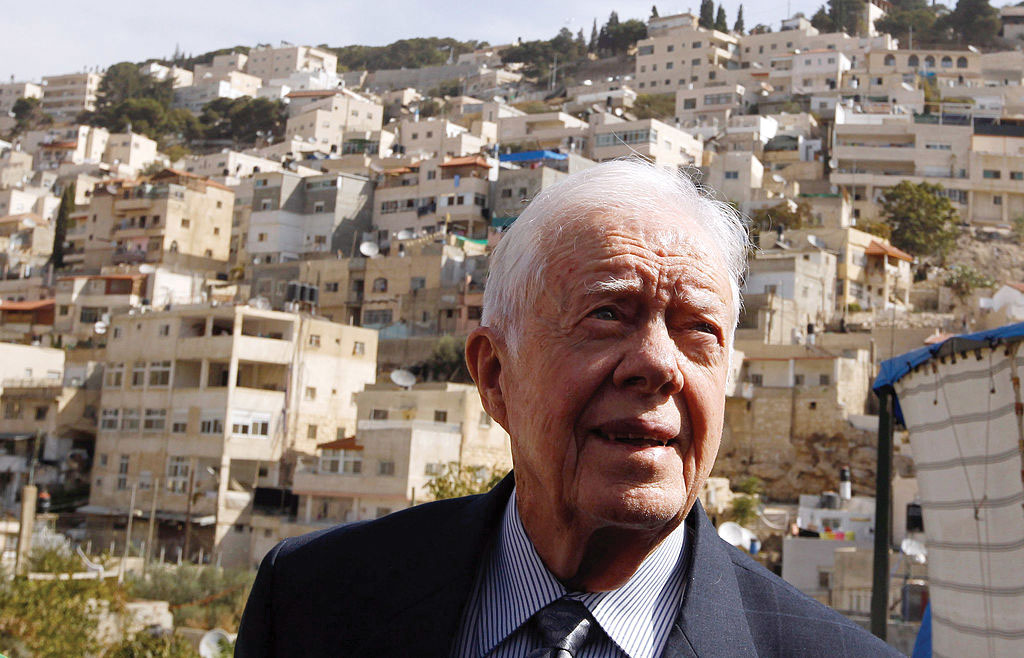
In 1909, the world, the then most influential New York daily newspaper, accused President Theodore Roosevelt of orchestrating a $40 million cover-up of corrupt practices in the building of the Panama Canal.
In response, Roosevelt sued The World’s publisher, Joseph Pulitzer, for libel. Pulitzer refused to back down.
Any resemblance to a current president and a New York daily newspaper is purely coincidental. But following three years of legal battles, the U.S. Supreme Court ruled in Pulitzer’s favor, throwing out the case and declaring that even the president of the United States was not above the law.
The encounter between the one-time penniless Jewish Hungarian immigrant and the most powerful man in America is but one episode in the film “Joseph Pulitzer: Voice of the People.”The film not only covers this story but serves as a biography of Pulitzer’s remarkable life, including his ascent from Jewish immigrant to one of the most successful journalists in America, his struggles with neurasthenia (with its accompanying mental and physical exhaustion), his intense rivalry with fellow publisher William Randolph Hearst and the centrality of journalism to the workings of a democratic society.
Pulitzer was born in 1847 in Makó, a town on the Hungarian side of the border with Romania. One of eight siblings, only he and one brother lived to adulthood.
Pulitzer’s first ambition was to become a soldier, and at 17 he took a ship to America as a recruit in a German-speaking unit of the Union Army in the final year of the Civil War. His first post-war job was shoveling coal, but he soon embarked on his journalistic career with a German-language newspaper in St. Louis. On the side, he taught himself law and became an investigative reporter. By 1880, he had founded the St. Louis Post-Dispatch, pledging to “oppose all frauds and shams” and promoting a writing style of short, snappy paragraphs.
Pulitzer published the names of all tax dodgers in St. Louis and, in those rugged days, it was no big deal when his managing editor, confronted by a critic of the newspaper, pulled out his pistol and killed the unhappy reader.
The film serves as a biography of Pulitzer’s remarkable life, his ascent from Jewish immigrant to one of the most successful journalists in America.
Two years later, Pulitzer had accumulated and borrowed enough money to take out a sizable loan and purchase the New York World for close to $400,000. He proclaimed the paper’s policy by stating, “Accuracy is to a newspaper what virtue is to a woman.”
Around the same time, he married Kate Davis, an Episcopalian and distant relative of Jefferson Davis, the president of the Confederacy during the Civil War. The marriage of a member of the Southern aristocracy to an immigrant Jew was apparently not considered as scandalous as it would be in a later century, Oren Rudavsky, the film’s director, told the Journal.
“There was relatively less anti-Semitism in America in the 1870s and 1880s, before the start of the Jewish mass immigration in subsequent decades,” he said. However, that did not mean that some of Pulitzer’s numerous political enemies and journalistic competitors refrained from referring to the publisher as “Jewseph Pulitzer” and “Joseph Jewlitzer” or caricatured him with a huge hooked nose.
Pulitzer used his newspaper’s clout to challenge a levy on pedestrians for walking across the newly opened Brooklyn Bridge; to bring the Statue of Liberty to New York Harbor; and to acculturate the waves of new Jewish and other immigrants to the country.
During the run-up to the 1898 Spanish-American War, Pulitzer, with thw war-mongering Hearst papers, was accused of resorting to yellow journalism, but Rudavsky cited as a more fitting epitaph the appraisal of writer Nicholson Baker, who judged Pulitzer to be “the most original and creative mind in American journalism that has ever been.”
The one-time immigrant endowed the Columbia University School of Journalism and the Pulitzer Prize, which primarily recognizes excellence in newspaper journalism.
“Joseph Pulitzer: Voice of the People” is the latest of some 20 films, mostly documentaries, by Rudavsky, half of which explore Jewish themes. Among them are “A Life Apart: Hasidism in America,” “Hiding and Seeking” and “Colliding Dreams,” which examines the history and impact
of Zionism.
Pulitzer, handicapped by poor vision throughout his life, became blind in his later years and died of heart failure aboard his yacht in 1911 at the age of 64.
As an exemplar of the fabled American success story, the penniless immigrant who slept on park benches when he arrived in America left a fortune of $30.6 million (roughly equal to $754 million today) to his wife and five surviving children.
“Joseph Pulitzer: Voice of the People” opens March 8 at the Laemmle Music Hall in Beverly Hills, Playhouse 7 in Pasadena and Town Center 5 in Encino.






















 More news and opinions than at a Shabbat dinner, right in your inbox.
More news and opinions than at a Shabbat dinner, right in your inbox.